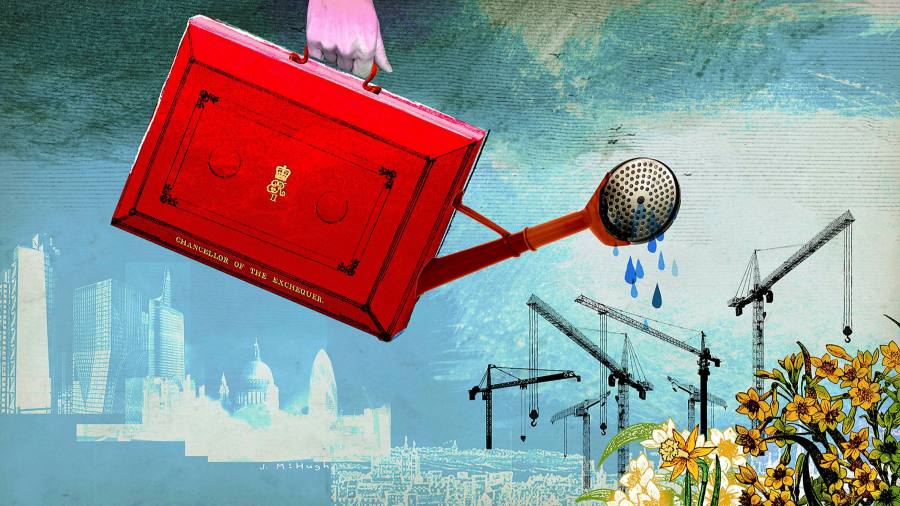[ad_1]
The writer, a former head of the Downing Street policy unit, is a Harvard senior fellow
As Mayor of London, Boris Johnson was often called the Heineken politician. In the words of the old beer advert, he could connect with voters and “refresh the parts†that others couldn’t reach. With the end of the coronavirus crisis in sight, and the Budget looming on Wednesday, the question now is whether he can reach left behind areas of the UK and make something of “levelling upâ€, which has become his animating slogan.
The pandemic has exposed stark inequalities, with poorer people and those in low-paid jobs most vulnerable to getting ill or losing their livelihoods. The Labour leader Sir Keir Starmer has called for a “1945 moment†to build a new welfare state. But it is not clear that a total restructuring is the answer to problems that will ultimately be best solved by private sector investment to boost productivity.
It sometimes feels as though Britain’s two main parties are squabbling in a corner, vying to outspend each other while extending emergency powers. In the wake of the effort to combat Covid-19, the public is assumed to be receptive to higher taxes, more spending and a bigger state. But detailed polling by King’s College London suggests it is split, both on the role of the state and on what constitutes inequality.
The only thing that unites voters of all ages and parties in the survey is a shared concern that where you live has an unfair impact on your life chances. This is a striking finding. Among people who expect inequality to rise as a result of the pandemic, the biggest concern is that disparities will increase — not between races or genders, but between more and less deprived places.
This suggests that the British public has figured out what academics have known for ages: that the UK suffers from damaging regional differences in income, health and productivity. As Professor Philip McCann has shown, no OECD country that is richer than the UK has a more regionally unbalanced economy. In Britain’s old industrial towns, nearly 1 in 12 adults receive incapacity benefits for poor health. Coastal towns have been especially hard hit by the decline of dockyards and tourism. In 2017, five in 10 of the local authorities with the highest unemployment were on the coast, as were 10 in 20 of the local authorities with populations in the poorest health. This translates into a huge loss of economic potential.
In the Budget, the chancellor Rishi Sunak must make big decisions about how much more to spend on support for families and households in the final months of lockdown. But he can also set out a longer-term plan to boost growth, get companies investing again and drive up prosperity. Poorer areas could benefit from an overhaul of business rates, from educational catch-up schemes, closer links between business and universities and more help to local authorities, which are under severe strain.
As yet there is no clear plan for levelling up, and no ministerial equivalent to Michael Heseltine, whose enterprise zones revolutionised some parts of Britain in the 1980s. Government ideas remain sketchy, with the main focus on infrastructure. While new bus routes, roads and rail links can boost the construction sector, they will not convert into long-term prosperity without an agenda to improve qualifications, galvanise private investment and decentralise public services to connect people more closely to the decisions which affect them.
I’ve sat in on quite a few discussions of levelling up lately. Depressingly, the debate often ends up either endorsing the payment of a universal basic income to every citizen; or shoving a bit of money towards sprucing up town centres. I oppose UBI because I fear it would pay people not to work, when what we most need is to restore the dignity of work. And I don’t believe that dribbling out regeneration money will resolve the complex jigsaw of inequalities.
What the debate frequently misses is that most people want a fair shot at success, not a handout. The King’s study demonstrates a strong faith in meritocracy. Rather harshly, despite the exceptional circumstances, survey respondents were more likely to think that job’s lost due to the pandemic were the result of personal failure rather than chance. Whatever you think of that, it suggests that a policy which can unite the country will help people to help themselves.
The Levelling Up Taskforce, a group of Conservative MPs mostly from former Labour “red wall†seats, believes the debate should focus more on taxes than trams. They are urging the Treasury to increase capital allowances for plant and machinery or industrial buildings, which would benefit manufacturing areas. Analysis by the taskforce’s chair, the MP Neil O’Brien, suggests that productivity spending is unthinkingly skewed towards places that are already prosperous. Transport money often follows congestion, for example, and housing infrastructure often goes to where house prices are highest. A rethink could put money where it can do most to boost growth.
Levelling up is a generational challenge, not a quick fix. It cannot be just about north versus south, since all regions have deprived areas. Nor can it be a naked political project to cement Tory votes in red wall seats. The prize from making the regions more resilient would be much bigger.
Right now, with the early days of Brexit creating alarming bureaucracy and barriers to trade, there is a risk that government will end up levelling down the economy. But levelling up is a worthy objective to refresh the parts that others have not reached — and the whole country should benefit.
[ad_2]
Source link





